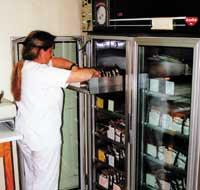It is possible to store platelets

Platelets are blood cells that help close wounds. In hospitals there is a great need for these cells and they are stored in blood deposits. However, there are problems when storing them, as their long-term storage is not possible. They cannot survive more than five days at room temperature and if they freeze they destroy the cell structures and die.
A group of scientists at the University of California have invented the way to freeze and resurrect cells. The freeze-drying process consists of instant cell freezing and ice sublimation. To solve freezing problems, they replace water from cells with a sugar, trehalose.
This molecule has the same intracellular function as water. It protects proteins and similar structures and keeps molecules stable during freezing. Once dry, they can be stored for more than a year and, at the time of use, just add water to resurrect the cell.





